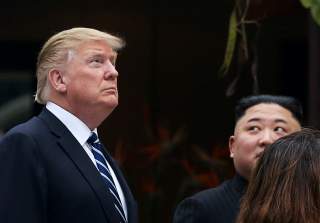The Hanoi Summit – We Asked Joon-hyung Kim What Happens Next in U.S.-North Korea Relations
"If dialogue is not resumed soon, the deadlock could last a long time. In this situation, the mediating role of the Moon government is heightened, but not at all easy."
Editor’s Note: Looking for more opinions on where we go after the Hanoi summit? Check out all 80 expert takes on where U.S-North Korea relations go next here.
In Hanoi, U.S. president Donald Trump and North Korean leader Kim Jong-un diverged in their attitudes toward the meeting. While Kim was desperate enough to say “even one minute is precious,” Trump repeatedly said “no rush.” Obviously, Trump took advantage of Kim’s urgency, and the expected deal was not made. Hence, no longer can we say that there are no failed summit meetings in the diplomatic world or that brinkmanship is Pyongyang’s signature tactic. Since what the United States and the Democratic People’s Republic of Korea (DPRK) want from each other has been clarified now, there may be another chance to close the gaps between the two countries. The unbroken formula of freeze for freeze can be good for future negotiations.
However, the damage to the trust and relationship promised with enthusiasm in Singapore seems so serious that recommencing the talks may not be so easy. This is especially true for Kim, because his sixty-six-hour-long journey to Hanoi was to reconfirm his trust in Trump. Therefore, Kim’s disappointment after the meeting could be synonymous to Julius Caesar’s “Et tu, Brute?” This new approach of a “trust game” that the two leaders have set up in Singapore is definitely in trouble. Even if it is not a complete breakdown, Hanoi is a setback or reset of the negotiations back to the pre-Singapore summit period.
That no one can break the table is one thing, but that no one is really willing to solve the problem by offering a bold concession is another. Now it is truly a fight of pride, in which neither Trump nor Kim is likely to surrender. As Trump has declared to the world that he is the boss, Kim has to decide to either accept or decline it. But it will be more difficult for him to give a bold concession after the failure of Hanoi. If dialogue is not resumed soon, the deadlock could last a long time. In this situation, the mediating role of South Korean president Moon Jae-in’s government is heightened, but not at all easy. Already objections are surfacing over Moon’s statement to the national security council that he wants to speed up efforts to resume tourism to Mt. Kumkang and restart the Kaesong Industrial Complex.
However, we should not forget that negotiation was not a choice, but a conclusion after military options have proved unusable. The whole point of diplomacy is making Kim come to the negotiation table. Now we all know that it is more realistic for the two sides to build trust through a small deal and creating an opportunity to reach the next step. Although it would be great for the DPRK to disclose and dismantle all its nuclear programs at once, many people now realize that this is practically impossible.
Maybe the ball is in North Korea’s court and the biggest loser is Moon, with time on nobody’s side. With American and South Korean elections looming, the window of opportunity to significantly accelerate the peace process is getting smaller. Nevertheless, we may be critical, but not cynical. Utilizing Trump’s habit of defying conventions, we should continue arduously to create positive results, however small.
Joon-hyung Kim is a Professor for the International Politics of the Handong Global University.
Image: Reuters

